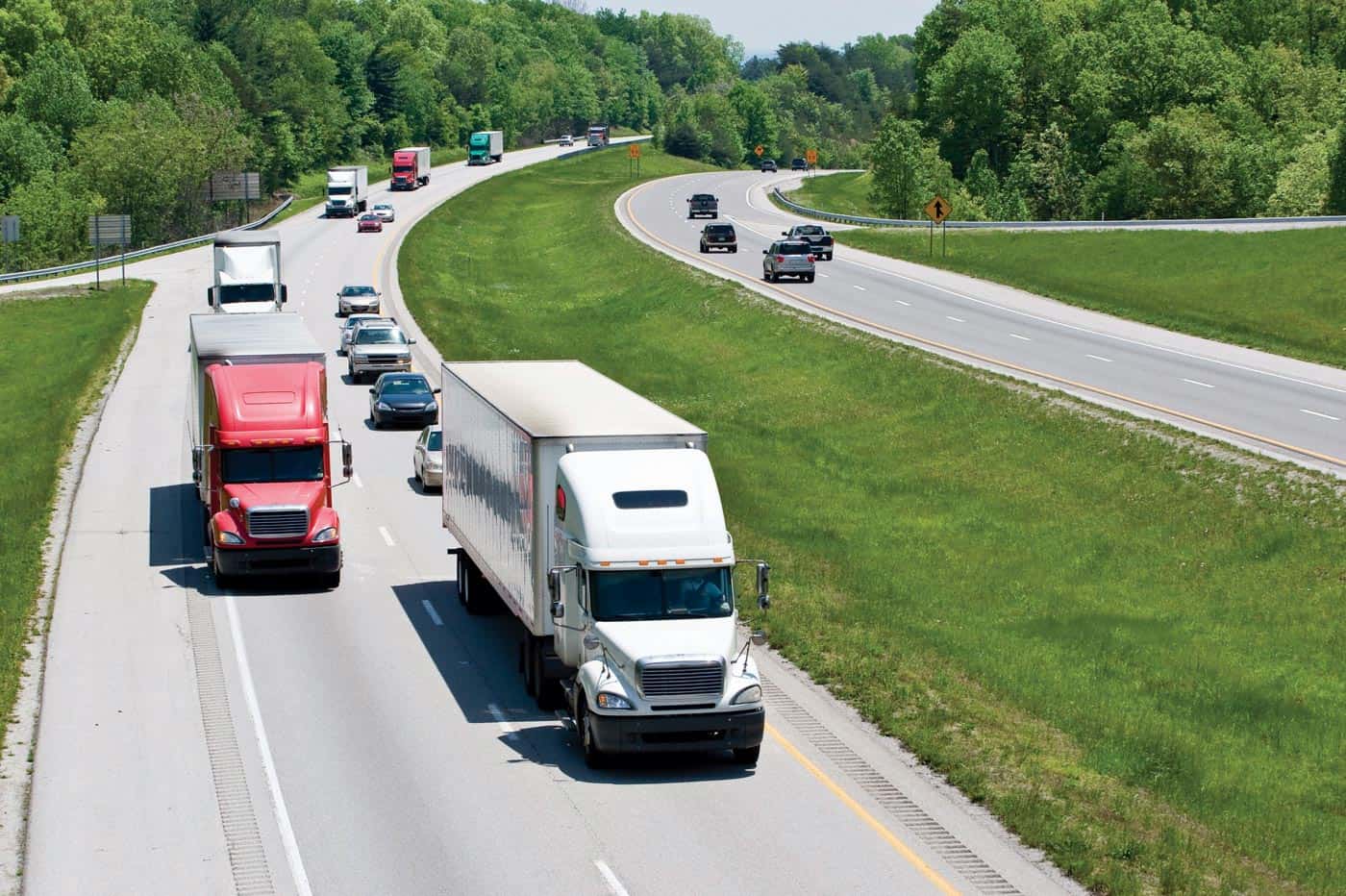New York Commercial Truck Insurance
If you are going into business in the transportation industry in the state of New York, you are going to need commercial truck insurance in order to get started.
This guide will introduce you to New York truck insurance requirements, types, and costs. We will also point you in the direction of some top carriers.
Get Your Free Insurance Quote
Who Needs Trucking Insurance in New York?
Anyone who operates a truck in New York for commercial purposes requires New York Truck insurance. That includes box trucks, flatbed trucks, dry vans, dump trucks, agricultural trucks, hazmat trucks, livestock trucks, long haul trucks, garbage trucks, and every other type of commercial truck.
What are the Coverage Requirements in New York State For Commercial Truck Insurance?
To legally drive a commercial truck in New York, you have to meet the minimum levels of liability insurance. Here are those minimums, which assume that your truck is over 10,000 GVW, and never leaves the state.
$5,000,000 Liability Insurance (Hazmat)
$300,000 Liability Insurance (Household Goods)
$750,000 Liability Insurance (General Freight)
$1,000,000 Liability Insurance (Oil Transport)
$5,000/vehicle and $10,000/catastrophe Cargo Insurance
What if you doing business across state lines? In that case, you also need to meet the federally-mandated coverage requirements for semi-trucks.
When you get your insurance policies, make sure that your carrier is filing the required forms with the US Department of Transportation (DOT) and New York’s state government.
Types of Truck Insurance Coverage in New York

Here are some examples of various types of insurance coverage you may require for your commercial truck in New York. The exact types you need depend on your vehicle, the cargo you are hauling, and other aspects of your individual business.
- Primary liability coverage: This type of coverage helps to over medical costs and repair costs in case of an accident.
- General liability coverage: This is a type of insurance coverage that pays for legal or medical costs if another person or their property is damaged by your business (note that it does not cover you or your employees, just third parties).
- Physical damage coverage: This coverage will help pay for repairs or replacement in situations where your vehicle is vandalized or gets into an accident. It also covers physical damage from weather or fire.
- Motor truck cargo insurance: You can get this type of insurance coverage to protect the cargo you are hauling.
- Trailer interchange insurance: Do you sometimes rent trailers for your business? Then you need a specialized type of insurance coverage called trailer interchange insurance. It will kick in if the trailer you are renting is damaged during the course of your work.
- Bobtail insurance: There may be times when you are driving, but you do not have a trailer connected to your truck. You need bobtail insurance in order to cover your truck in these scenarios.
- Non-trucking liability insurance: Often abbreviated simply as “NTL,” non-trucking liability insurance covers you if you decide to drive in your work vehicle sometimes for non-commercial purposes. This is most likely to be the case if you drive a smaller type of truck, like a box truck, and you make some kind of side trip off the clock.
- Uninsured motorist insurance: In theory, everyone is supposed to carry insurance when driving. But some motorists do not, or have very limited insurance. Alas, that means that they may not have an available policy to pay out. If you get into an accident involving such a driver, you will be covered by uninsured motorist insurance.
- Trucking umbrella policy: Another name for this type of coverage is “excess liability insurance.” It can provide you with extra coverage in case of gaps in your other policies, or if you simply chose policies that have lower maximums than is ideal.
- Workers Compensation: If you have any employees, you will need to get workers compensation. This is the type of insurance that pays out if they get sick or injured on the job. It covers medical care and lost wages. It is legally mandated to buy this type of coverage in every state if you have even one employee. New York is no exception.
- Occupational accident: This is similar to workers’ comp, except that you can get it to cover yourself if you are an owner-operator. If you get injured or sick on the job, it will help to offset your lost wages just as workers’ comp would do for your employees. It likewise can help pay medical costs.
Keep in mind that these are just examples; there are some other types of truck insurance you may want to look into as well, depending on the details of your business.
What are the Average Costs for New York Truck Insurance?
Costs vary for New York truck insurance. But on average, if you only are operating a single truck, you can expect to pay somewhere around $12,800. At the lower end, insurance may run around $9,000, and at the upper end, it can exceed $15,000.
The above estimates assume that you are purchasing liability, physical damage and cargo insurance. If you are getting additional types of policies, then your overall costs will be higher.
Here are some other factors that can affect how much you pay for truck insurance in NY:
- Deductibles: If you have a high deductible, the monthly cost for your insurance will be lower, all other factors being equal. But you will have to pay more out of pocket before your insurance starts paying for things if you need to make a claim. As there are pros and cons to high and low deductibles, you have to decide for yourself what makes the most sense for your business.
- Coverage amounts: The higher the coverage amounts, the higher the monthly costs will be. This, too, is an area where there are tradeoffs either way. So, you will have to assess for yourself what you are comfortable with in terms of balancing monthly costs and ongoing risks. You might even decide to go with high deductibles and low coverage amounts for some policies, but not for others.
- Your driving experience: Those with more experience driving trucks professionally in New York may qualify for lower rates than new drivers. The underwriting team will assume you are able to drive more safely since you understand the road and the job better than a newbie.
- Where you drive: Your costs may differ quite a bit of you are driving in, say, New York City, versus in a rural part of the state. If you drive out-of-state as well, that will also influence your insurance rates.
- What you haul: Different types of cargo carry different types of risks. You may pay more in insurance premiums if you are hauling hazardous materials, livestock, items that can spoil, etc. The more things that can go wrong with the cargo, the higher the risk for the insurance company.
- Your claims history: If you have a clean history without any claims over a number of years, then you probably will qualify for better rates than you would if you had claims. Frequent claims, of course, are the worst to have on your record.
- Discounts: You might qualify for discounts if you are willing to follow certain safety measures, and/or you have a history with the carrier that is claim-free. Another common type of discount is one you get for bundling multiple policies. As you probably are purchasing more than one policy, there is a good chance you can find this type of discount. Be sure to ask carriers what discounts they offer, or you will miss out on deals.
- Underwriting guidelines: The underwriting guidelines one carrier uses are different from those another carrier uses, and so on. These guidelines are based on how each individual carrier assesses risk levels. So, one carrier may end up offering you a better price than another, just based on those differences, even if everything else is the same. This is why you should shop for deals instead of just taking the first quote you get.
Where to Get New York Truck Insurance Coverage
If you are excited to get on the road with your trucking business, then you need to get the insurance you require to legally operate your vehicle commercially. Click below to visit any of our recommended New York truck insurance carriers.


